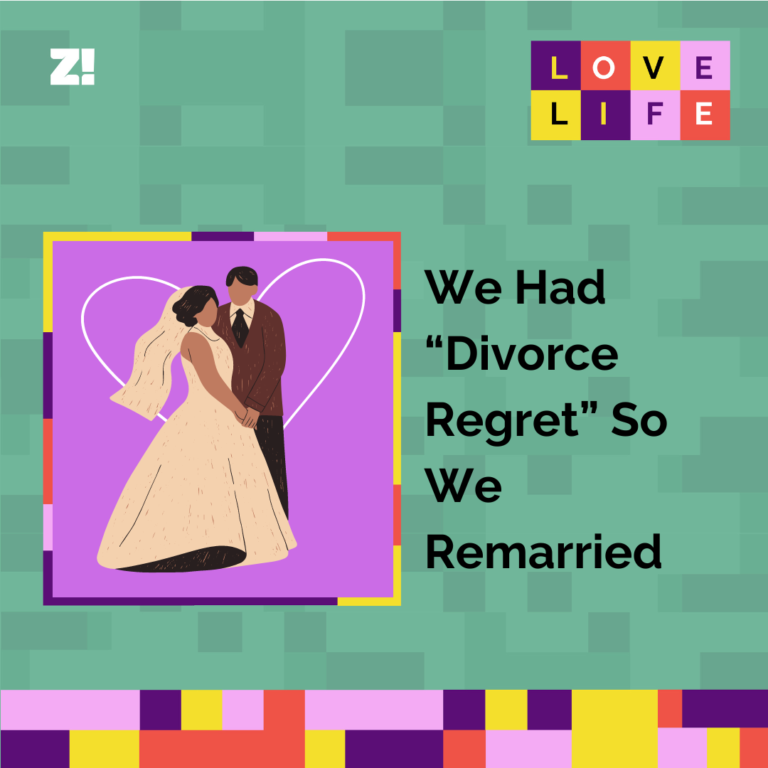Navigating life as a woman in the world today is interesting. From Nigeria to Timbuktu, it’ll amaze you how similar all our experiences are. Every Wednesday, women the world over will share their experiences on everything from sex to politics right here. This is Zikoko’s What She Said.
This week’s #ZikokoWhatSheSaid subject is a 28-year-old Nigerian woman who’s recently had a South-Eastern wedding. From the point of view of a younger millennial, she talks having multiple ceremonies, bride price negotiations and how everything surprised her.
Let’s start at the beginning of the “getting married” process. What happened right after the date was fixed?
My first thought was, “Okay, you’re ready to do this adulting thing.” Then, it was like rush, rush, sharp, sharp, let’s get this done. We’d already scheduled the date at the time of my proposal, to be about six months after. So the experience was overwhelming. There was no time to actually sit down and process it. Going to the market, going to see the family, just all over the place almost immediately.
I thought people get engaged first, then one day much later, they say, “so when should the actual wedding be?”
People wait when they’re just not ready to get married. But why propose when you’re not ready? What’s the point? Do you want to become a Lord of the Rings?
LOL
Jokes aside. Yes, there are people who get engaged and don’t immediately decide on a date. But personally, I think once you’ve proposed to someone, the next thing to do is start planning. I wouldn’t say it’s the normal way. We just wanted to start doing our thing together.
What was the point of waiting when our parents already knew it was official. Six months is enough time to plan, especially if you can fund it. And that’s why it’s important to be in an intentional relationship; you guys are already talking about these things. It’s also very good for men to be intentional. It makes things so easy.
How so?
Because if he’s already determined, “I want to be married by February 2022”, he’ll make sure he proposes on time. Then, you both already have a date to work towards. There’s no uncertainty, at least, not too much.
Fair enough. So what were the next steps?
We officially went to meet our parents because you don’t want a case where you accept a proposal, and then, your parents are like, no. So the next logical step was to build a relationship between us and our parents so they know we’re serious.
I’d already told my dad about him, and I went with him to meet his parents. Then, we set dates that were friendly for everybody. After that, I had to draw up a list for the traditional wedding, and a different one for the white. I started asking friends for their wedding Excel sheets, and all that.
Here’s exactly what wedding planners go through daily: “Nigerians Like to Do Anyhow” — A Week in the Life of a Wedding Planner
That’s a lot. What surprised you about the wedding preparations, and what didn’t?
I would say everything surprised me. Everything. First, I had no idea it would cost the extent of money I spent. But I think what really shocked me was how the wedding matters to parents as much as it does to you. The idea that your wedding is yours? More often than not, whether they’re bringing money or not, your parents are in charge. One parent would say, “I know you want it this way, but this is what we want.” The other one wants exactly the opposite. So you can’t just say this is what I want, and go to sleep. It also matters to them. And it’s not really from a bad place.
Like what, specifically? What were you parents/families’ expectations?
Okay, so my husband’s family is Catholic, and mine is Anglican. If you know these two Orthodox churches, you’d understand what it was like. It was the case of, “Where do we now get married?” I even have a Catholic background from my maternal side. So for a while, it was a huge conversation. When it looked like we would marry in the Anglican church, his family still asked why not a Catholic church? I mean, even if your husband has agreed to something, you still have his family to contend with.
Right
Also, Igbo people always go to their villages to marry. The average family has way better houses there than they do in the city. When you go, you have to add some value to the house. Maybe do a makeover, touch up the paint, clean, retile and so on. Things that ordinarily wouldn’t be a big deal.
But your parents would say, “No, this person is coming. We have to…” Or maybe, “You’re the first doctor in the family. This wedding has to be this or that. We can’t keep it inside the gate. We have to visit the extended family, the kindred, so that everybody passing through can see you and what you’ve done.” They just expected us to grant all their hearts’ desires, especially culture-wise. So compromises had to be made.
Like what?
I ended up getting married in an Anglican church in Lagos instead of a Catholic church in the east. Because we’d done the traditional wedding in the east, we wanted most of our loved ones, friends and friends of family who couldn’t make it to be part of the ceremony in Lagos.
How exactly did the decision go?
It went really well. Everyone was happy, and at the end of the day, nothing mattered. Just the joy on everyone’s faces.
You mentioned earlier that the wedding expenses surprised you. Tell me about that
As an Igbo lady, I had to tie a George wrapper. When I went to the market, I saw how ridiculous things were, like really, really pricey. You see people on Bella Naija and asoebi pages on Instagram, and you think, “Oh, this will not be expensive na. Max., maybe ₦50k.” Then, you touch the material in the market and hear ₦300k.
Even these wedding tailors on Instagram shocked me o; calling prices here and there. There were many times I wondered if I should’ve maybe saved more. But then, who wants to spend their life planning for a wedding that may or may not happen, so I just really managed everything. In general, the expenses got me thinking sha.
You’ll want to read this too:
₦300k for fabric? How did you manage?
I had to walk around the whole of Balogun market to find something that worked with my budget o. And I ran away from IG tailors. LOL.
LOL. What about the formal introduction and bride price negotiations? Can you tell me about that?
I think my case was quite unconventional. When it comes to the typical Igbo family wedding rules, and what I even expected for mine, it didn’t end up like that. It was completely different, and I’ll explain. My parents are based in Port Harcourt, and my husband’s parents are in Lagos. So when I told my dad there was somebody who wanted to speak to him and express his intentions to marry me, he was like, “Who is this young man?” And I told him everything.
When we were to see my dad in particular, work came up, our schedules were scattered, so we couldn’t go. But my dad would have frequent phone conversations with him, and when it was time for the introduction in August (2021), his parents sent some of their relatives in Port Harcourt to see my parents.
They went with drinks for what we call Iku Aka — to knock on the door and say, “This is the person we want to marry?” At that point, my dad already knew my husband well. If we had gone to Port Harcourt to do Iku Aka, gone back again for the introduction, and again for the traditional wedding, I mean, all that travelling just didn’t make sense.
No bride price involved?
I come from a family of five girls. For the bride price, my dad often says things like he’s not selling his girls. But because our culture demands it, he went to his village to tell them, “What do I need to do to make this a peaceful process?” We’re from Imo State, Owerri, so they came up with this “normal” list, which I found very ridiculous.
I can imagine. How was it sorted?
My dad just met my husband’s dad and told him to bring the cash equivalent. When we went for my traditional ceremony, I saw them sharing the rice, and all those things from the list, to the women and men in our family. My dad didn’t make any trouble, and everyone just followed suit.
Wow. So no bride price madness? I’m happy for you
Hmm. There was a bride price for being an undergraduate, and different ones because I’m a graduate and a lawyer. They even had one for if I had a master’s degree or professional certifications. When I saw the list, I cringed. But I think my parents weren’t obsessed with that stage. They wanted to do what was right by where we were from, but they just said, “You know what, just do what you can do.”
For a seamless wedding, start here: The Complete Guide To Throwing a Nigerian Wedding
Parents of the year!
Yes o.
So after they’d come to symbolically pluck you from your father’s garden?
LOL. We’d chosen a date when all our family members in the east could attend the Trad because a couple of people also couldn’t come down to Lagos for the white wedding. In our bid for the perfect date to accommodate everyone, we chose one we later realised we couldn’t get married on.
What?! How?
According to customs and traditions, Igbo people have four market days: Nkwo, Orie, Afor and Eke. In Owerri, we don’t get married on Eke market day. It’s believed if you do, the God of Eke would strike you with afflictions. In my husband’s place, they don’t get married on Nkwo market day. And what I mean is, even if the wedding is not on the day itself, you can’t go to a woman’s place to bring her back home on that day.
The main goal of an Igbo wedding is to sip the palm wine and give your husband to drink. That’s the most significant part, not the elaborate party. So imagine a scenario in which, on the day of the wedding, everybody is already cooking outside, and I get a message from my husband’s people that we can’t get married because it’s Nkwo market day in their own place, and they can’t come to my father’s home in the village. This was 4 a.m., so we were like, “what’s going to happen to all these caterers, all the guests?”
Wow. Sounds like a disaster
In fact. We had to start thinking. My husband’s people eventually came up with a plan to remove handing over the palm wine, because it would bring curses and all of that. They had to come the following day for that, so I had a two-way traditional wedding.
But guess what. The day we handed over the palm wine was now Eke market day. Remember I said in my own place, we don’t do wedding ceremonies on Eke. We’d already booked our flight to go back to Lagos the next day, so we couldn’t shift it. It was just messy. We had to do it hush hush in my father’s sitting room, and that was when the bride price was paid.
Again?
Well, even though they’d already sent money to buy the things on the list for the traditional wedding, there was still the main bride price. And all my dad collected was a ₦1000 note.
They put a lot of money on a tray and gave it to my father, saying, “Is this enough payment for us to collect your daughter?” Symbolically, my dad just picked some notes. I can’t recall if it was ₦1k or ₦500 notes they put on the tray, but my dad picked a note and said, “I’m not selling my child. I adhere (sic) you to take care of her. But I’m taking this one as a symbol of the agreement between our two families.”
And how do you feel about the whole experience almost a year later? What about it makes you happy?
I’m so glad I got to see all my relatives in the village. Looking at the pictures make me happy. Listening to our parents retell the stories of the trad day to their friends and how successful the event was makes me happy.
Our wedding album just came in yesterday, and I was grinning sheeeppiisshhllyyy (sic) as I flipped through… It made me smile to see our parents, siblings and dearest friends with sparks in their eyes and large smiles on their faces.
So yeah, the pictures and memories will always make me happy. And generally, I feel good about the experience. If I had to, I’d do the whole thing again. But maybe with me more in control. LOL.
If you’d like to be my next subject on #WhatSheSaid, click here to tell me why
Definitely read this next: 8 Married Nigerians Share the Biggest Regrets From Their Wedding




